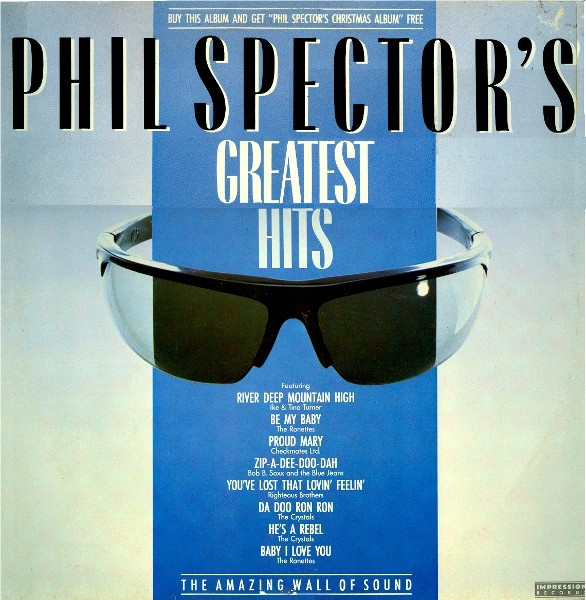The Beatles: Help! - 1965
This album largely existed to serve as a "soundtrack" for the film of the same name. It was expanded to include both some new non soundtrack songs and a couple of cover versions thrown in for good measure.
After the diversification of the end of the previous year's Beatles For Sale, where John Lennon's questioning, often cynical approach to relationships was given free reign there would have seemed to have been a conscious effort to "lighten things up" a little, mainly to suit the happy-go-lucky ambience of the film.
The country rock vibes that were very present on Beatles For Sale are still there. Indeed, it would take until 1966's Revolver to see the demise of those completely.
The lead off huge hit of Help! is a great start, Lennon laying himself bare, but in a very singalong, impossibly catchy way, so much so that any real cry for help is lost beneath the appeal of the upbeat tune. Lennon later claimed, expressing personal regret, that the song was changed due to "commercial pressure" from a morose piano ballad to the "fun" song that suited the film.
The Night Before is a mid-paced country based rocker from McCartney's pen with a throaty vocal from him, all very nice and steady with good sounding percussion and some nice guitar right at the end. It has a melodic catchiness to it that makes it stick in the mind.
The old "Dylan influence" chestnut rears its head again in Lennon's sensitive You've Got To Hide Your Love Away (inspired, apparently, by manager Brian Epstein's homosexuality, although only the chorus would seem to back that up). Some acoustic guitars, lyrical sharpness and a starkness of delivery do not a Dylan make. Dylan, as it happens, was, around this time, recording his electric stream of consciousness in Subterranean Homesick Blues while The Beatles were going all acoustic in the manner of Dylan's earlier albums, (supposedly).
An appealing, but by now characteristically downbeat tune from George, I Need You is almost laconic in its vocal delivery. It contains an intriguing guitar sound just behind the vocal refrain, almost Who-like and definitely providing the first sonic hint as to what Rubber Soul and Revolver would sound like. Could it have been the group's first "proper" rock song? It has always been a favourite of mine.
Another Girl was a lively love song largely written and sung by McCartney. It features some good rocking guitar in parts.
You're Going To Tell That Girl is a very 1950s rock 'n' roll type ballad featuring Lennon's melodic yet at times vituperative vocal. Ringo Starr's madcap bongos on this track are utterly incongruous and irritating. Why Ringo? Why?
The jangly, instantly recognisable strains of the marvellous Ticket To Ride need no introduction, do they? It has been said by several writers over the years that this was recorded around the time The Beatles first dabbled in LSD. If true, the drug did a good job. The song is perfectly created and performed, possibly the high point of their career so far. The guitar sound on here would continue with successful songs like Nowhere Man and Paperback Writer.The rockabilly style cover of Act Naturally, an old country and western hit, suited Ringo Starr's deadpan vocal delivery and his ordinary but loveable persona perfectly, particularly as shown in the films. Indeed, it almost could have been written for him (obviously it was not).
It's Only Love was lyrically shallow but melodically catchy, Lennon apparently hated it. I like how Lennon would occasionally own up to loathing songs. Bryan Ferry covered it quite well in 1976 on his Let's Stick Together album and Price Of Love EP single, though, as did Gary 'US' Bonds in 1982 on his Dedication album.
A Harrison number, You Like Me Too Much sounds like something from the She Loves You days. It is very early 60s pop in its sound - innocent and twee but featuring a nice piano break. It was also surprisingly un-melancholy for a George song, particularly from this period.
Another disposable, early 60s style pop number, possibly dating from the very early days, was Tell Me What You See, featuring McCartney on vocal. McCartney had not really contributed much to Help!. It had largely been Lennon and, to a lesser extent, Harrison, something common in the earlier Beatles albums.
So, the country-ish, jolly, folky romp of the mod-ish I've Just Seen A Face betrayed a few "problems in love" lyrics from the seemingly loved-up McCartney, but it was not a very convincing attempt on his part to get back "with the project", to be honest. That said, it has a certain carefree appeal, melodically.
Then, of course, however, there is McCartney's seismic redemption with his solo recording (with orchestration) of the most covered song in history, Yesterday. It featured classical music instrumentation for the first real time, something that would be utilised considerably by George Martin and McCartney on songs like Eleanor Rigby and She's Leaving Home.
With Dizzy Miss Lizzy, the album ends on a lazy, irrelevant low point in a muffled cover of this Larry Williams song, which seems to suffer from awful sound problems.
No need for this to have featured at all. It would be their last cover version. The times they were a-changing....











